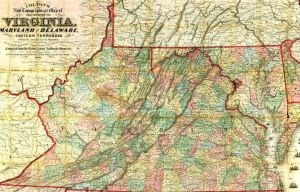 Against the backdrop of the year drawing to a close, readers learn details of Southern Baptist Convention mission efforts in a report from Virginia Baptists’ Religious Herald newspaper that is republished in other Baptist newspapers of the South. Reflecting the currently shuttered status of the Richmond organization, the news contained in the missions report is from the first half of 1862.
Against the backdrop of the year drawing to a close, readers learn details of Southern Baptist Convention mission efforts in a report from Virginia Baptists’ Religious Herald newspaper that is republished in other Baptist newspapers of the South. Reflecting the currently shuttered status of the Richmond organization, the news contained in the missions report is from the first half of 1862.
Both at home and abroad, the Southern Baptist Convention is brought into remarkable connection with that most difficult problem to the student of providence–the bearing of war on the progress of the gospel.
We need not say that a protracted, gigantic and bitter conflict is raging in the Confederate States, where the Convention has its seat. This conflict, of course, stretches out over the Indian Territory, the sphere of missionary effort among the aborigines of the country; and brethren Slover, Burns, Compere, Rice and Buckner, have been stripped of all their property and forced to seek refuge for themselves and their families in Arkansas and Texas–leaving but one laborer at his post, (Bro. Hogue in the Cherokee Nation.)
In China, the only Asiatic field of the Convention, the same spectacle of strife and bloodshed meets the eye. One of our missionaries there, Rev. J. L. Holmes, fell a victim to armed violence in October of last year. And a letter written by Mrs. Hartwell from Tungehau, June 25th (which we find in the Christian Index,) shows how Shanghai, the most hopeful of our Chinese mission stations, stands endangered by the tide of war. “The Tae Ping Rebels,” she writes, “now surround Shanghai, and are burning, plundering and destroying everything they can lay their hands on. They seem determined to starve foreigners out. Everything is at famine prices there.”
This cloud hangs over the Central African Mission of the Convention, which has always seemed the most promising of its missions among the sons of Ham. A letter, lying before us, from Brother R. H. Stone, written Abeokuta, March 28th, states that, in the war of the tribes, Ijay had fallen, and was entirely destroyed, with our mission there. Two towns, within a few hours’ walk of Abeokuta, had been captured and given to fire and sword. Abeokuta was threatened, and Bro. Stone draws a graphic picture of the consequent agitation and alarm:
“For several days and nights, the suspense was extreme. Thousands of warriors flocked in from the farms, and hastened to the gates. Every night the cry was raised by the women that the enemy was very near. One night especially I sent a messenger to the gate nearest us, and he was told that they were slowly approaching in three grand divisions, the principal of which would attack on our side. As we were outside the main walls, this created great consternation among our people, who wanted to hasten within the walls; but they manifested no little faith, and soon became composed. It was truly a trying moment. This stealthy and murderous foe could be seen in our imagination almost at our very door. I committed all to the care of the Lord, and went to sleep, expecting to be awakened by the roar of battle. But they have not yet come, though it was said they would attack the town to-day.”
If that faith is most precious in the sight of God, which he tries most, as gold is tried, in the fire–may we not argue from this prevalence of war in all our chosen spheres of effort for the conversion of the nation that He has a great work in reserve for us, and is fitting us for it by causing our path to lie through the furnace of great affliction? Oh, may we learn the lesson which this severe tuition is designed to impress, and walk more with God, even if He should not graciously deign to call us to do more for Him!
Although not expressly stated, perhaps the irony of Southern Baptist mission efforts derailed by war on three continents is not lost upon some readers.
Source: “Our Missions and the War,” Biblical Recorder, December 1862 (link)


